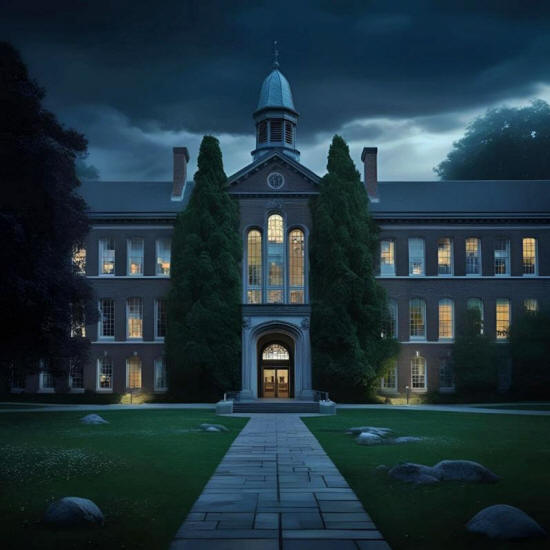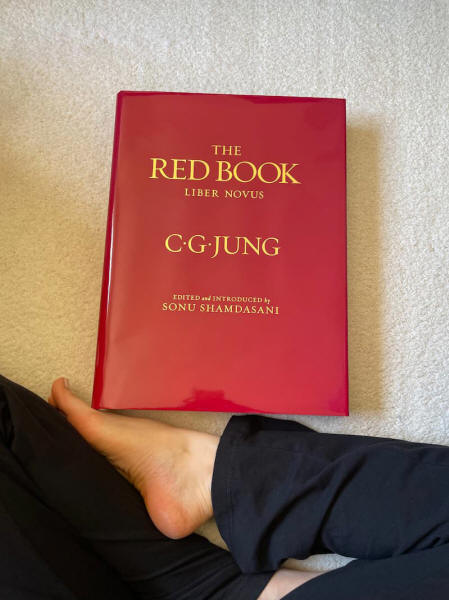|

by
Aletheia Luna
April 03, 2025
from
LonerWolf
Website
Spanish
version

Why formal
Education
can
limit your Mental, Emotional,
and
Spiritual Growth...
-
Leonardo da Vinci
-
Eckhart Tolle
-
Stanley Kubrick
-
Frida Kahlo
-
Benjamin Franklin
-
Krishnamurti
-
Jane Austen
-
Steve Jobs,
...some of the greatest people in history were
(and are) self-learners or autodidacts.
As author and autodidact Helen Beatrix Potter once noted:
"Thank goodness I was never sent to school;
it would have rubbed off some of my originality."
In a world where
formal education is increasingly failing us
on numerous fronts and the bite-sized dopamine-fuelled mediocrity of
social media is decreasing our capacity to think critically, being
an autodidact is more needed than ever before.
I've recently fallen in love again with my local library, and let me
tell you, self-directed learning is empowering and feels wholesome
and soul-nourishing in a way that's hard to express fully.
Not only that, but being an autodidact is a huge part of the
conscious and intentionally lived life path and spiritual journey as
a whole.
You'll find that you'll experience way more
synchronicity, bursts of
exhilarating discovery, and sometimes even moments of mystical
realization when reading and learning.
Learning makes life richer and deeper, so,
why not embrace being an autodidact...?
7 Signs You're an Autodidact

Not everyone is an autodidact.
Not everyone has a passion for self-directed
learning.
Some people are content to learn passively or
not at all, and that's that.
If you're here reading this right now, I'd say
there's an extremely high chance you're an autodidact.
But if you're not sure, here are some signs:
-
You're a high agency person, meaning that
you live in an active, intentional, and focused way by
taking responsibility for your life and being self-directed.
-
You have a lust for learning, and you're
wildly curious - aka, you find joy in researching and
discovering new ideas, methods, philosophies, etc.
-
You value depth and enjoy long-form
content like books, articles like this, long podcasts, and
in-depth videos.
-
You feel repelled by social media because
it feels too shallow, and you don't like passively consuming
superficially regurgitated info-tainment.
-
You feel suffocated by formal education
as it kills your desire to learn or grow.
-
You're a gifted deep thinker or feeler,
what Polish psychologist Kazimierz Dąbrowski called "over-excitability,"
meaning that you have a heightened response to external
stimuli and stronger reactions compared with others.
-
Your idea of relaxation is to sit down
with a good book - simple, but self-explanatory.
Can you relate to these signs? If so,
congratulations...!
You've just joined the ranks of some of the most
creative and innovative people in the world.
Why Formal Education
Can Limit Your Mental, Emotional, and Spiritual Growth

Okay, I have a lot to say about this, so get ready.
Firstly, many of the most passionate and talented writers, artists,
film directors, philosophers, and musicians out there are vehemently
against traditional forms of education.
Mark Twain, George Bernard Shaw, Albert
Einstein, and Margaret Mead,
... for instance, were all highly talented
autodidacts who spoke up against the innumerable limitations of
formal education.
Bertrand Russel, for instance, was once recorded saying that,
"men are born ignorant, not stupid; they are
made stupid by education",
...and Henry David Thoreau was attributed
to saying,
"What does education do?
It makes a straight-cut ditch of a free,
meandering brook."
So, back to the question:
Why does formal education often limit your
mental, emotional, and spiritual growth?
Let's start with a personal sharing.
Before that, here's a quick disclaimer:
If you're one of those people who loved
university or college, more power to you.
You can absolutely be an autodidact and a person
who was formally educated.
I'm only speaking from my own experience and what
I have learned from others who have gone the traditional route.
Also, some professions benefit from structured formal learning
(doctors, pilots, electricians, accountants, etc.).
You wouldn't want a self-taught surgeon doing
triple bypass surgery on you, would you?
This critique is mainly aimed at the humanities.
I) My Experience With University

I quit university for a number of reasons.
In fact, during my years at university, I
stopped reading, I stopped inquiring, and I stopped doing what I
loved the most:
writing - which was ironic because I was
studying to become a librarian at the time (later
contemplating being a psychologist).
Here's the reality:
all passion, drive, and curiosity to
learn about the mysteries of life slowly evaporated during
my years in formal education.
The days, weeks, and years of homework,
assignments, mandatory readings, and exams slowly drained me of
my creativity and lust for life, like a cancerous tumor.
All I can say is that thank god I finally came to my senses one
day and quit, for good.
Luckily, I'm not the only deviant "college dropout" who holds
these sentiments.
In fact, many people, from Maya Angelou
to Bill Gates, never completed college or university.
Of course, not all college drop-outs do well
in real life - that's a misconception.
But there's nothing wrong with opting out of
formal education, especially if it's killing your love of
learning and therefore constricting your ability to
psycho-spiritually grow and transform.
II) 5 Reasons Why Formal
Education Can Be Soul-Sucking

I realize that some people love the experience of formal higher
education - and sure, there are benefits.
More job security (in some cases),
networking, building new friendships, group learning, unique
opportunities, and so on.
Don't get me wrong:
you can be both an engaged student and a
passionate autodidact - they don't necessarily cancel each
other out.
But I've observed that the more deeply
steeped in formal study a person tends to be, the more the
sacred love of learning begins to wither and die.
Here's why formal education can be so soul-sucking...:
1. It
imposes pressure on you and an immense amount of stress
Basically, the rule is,
"if you don't learn this by this
time, you've failed."
Deadlines create an immense amount of
stress and pressure, and this is not a healthy approach
towards learning.
I remember the feeling of pure, breathtaking freedom that
came with quitting uni forever.
It was as though a heavy mental burden
had been lifted, and I suddenly came to realize how much
psychological tension the whole institution had put me
through.
The amount of anxiety you have to deal with while studying
is completely unnecessary.
2. It robs you of all of
your time
Hours of dutiful reading, hours of highlighting textbooks,
hours of strained eyeballs staring hopelessly at the
computer screen...
Forget cultivating any meaningful
interests or hobbies, studying eats up all your energy,
time, and life force vitality.
3. It robs you of
psychological freedom
During my stint as a uni student, I noticed this bizarre
phenomenon happening inside of me.
Whenever I stole a few minutes or hours
for myself, I often felt guilty and edgy, as though I was
doing something illegal.
Basically, my mind was craving to study,
not out of free desire, but imposed fear that I was somehow
slacking off or not working hard enough.
Talk about servitude...
4. It motivates you with
fear
In many parts of the world, we're taught from a young age
that if we want to be special, successful or amount to
anything important in life, we must slave away for 3-4 years
to earn a slip of paper that entitles us to a "bachelor" or
"masters" title.
Most people go to college either out of parental obligation
or paranoia.
Both are motivated by fear...
5. It kills your creativity
Everything in colleges and universities is predetermined,
from the syllabus to the resources, set readings, and
excursions.
College tells you what to do and expects you to follow
implicitly.
You must walk within their strict
boundaries at all times, using their limited materials to
answer their limited questions in their limited formats.
Wild, unbridled curiosity is
discouraged.
Dull-minded conformity is promoted
instead...
6. It
creates mental rigidity and a dislike of ongoing learning.
As Albert Einstein was recorded saying,
"One had to cram all this stuff into
one's mind, whether one liked it or not.
This coercion had such a deterring
effect that, after I had passed the final examination, I
found the consideration of any scientific problem
distasteful for an entire year."
If even famous physicist Albert Einstein was
turned off science by formal education, imagine what effect it
has on us!
Even I experienced this with my "library science" studies.
I love libraries and what they stand for, but
after studying to become a librarian, I truly came to understand
the meaning of the word "abhor."
The fact is, many formal education institutions cram a bunch of
knowledge into your brain and expect to make a professional out
of you while slowly killing your capacity to be
curious and creative...
Sure, you may have finally gained your socially acceptable
degree, but the years of stress and dutiful learning have
created a rigid, institutionalized brain.
Furthermore, those of us who have undergone the torture of
education camps will understand how nauseating the word
"education" becomes after graduating.
Who the hell wants to become a "lifelong learner" and much less
an autodidact after experiencing the stress of a formal
education?
It took me ages to get interested in self-directed learning
again after serving my time at uni - about a year and a half
(some never get it back).
Unconsciously, I identified any form of
education with classrooms, exam papers, and hours spent
squinting at dry textbooks.
Thankfully, I gradually realized that obtaining knowledge
doesn't have to be excruciating and burdensome, and I'm glad I
did.
These days, being an autodidact is my "bread and butter" - or
how I make a living for myself, thanks to the democratization of
learning via the Internet...!
Sadly, many people come out of college and never look back,
losing all interest in learning and growing, thus missing out on
a whole side of life - one that is rich with the rainbow of
other people's lived experiences, lessons, and insights.

As I mentioned previously, being an autodidact is a huge part of the
spiritual journey and path of healing.
In fact, without a curiosity to learn, explore, and expand
our intellectual horizons, fuelled by inner passion, we can easily
become mentally, emotionally, and spiritually stagnant.
How can we
grow, heal, and transform without being open to learning new things
about ourselves, others, and the world around us?
Yogic philosophy calls this self-directed learning path Jnana
Yoga, which involves,
contemplation, meditation, self-inquiry, and
swadhyaya or self-study.
Using a Western philosophical approach, we can
see that this drive to self-educate and evolve comes from the inner
genius or daimon:
the guiding force of the
higher Self who
influences what you're interested in and attracted to - without you
making a conscious choice.
To be an empowered autodidact,
you need to be able to listen to this inner
call and follow your passion and curiosity, trusting that what
you're drawn to is from your Higher Self, who is drawing it into
your life for a good reason.
This entire Website is a shrine, in a sense, to
autodidactic, self-directed learning.
So I welcome you to go as deep
and as far as you want.
How to Become an Autodidact -
Some
Suggestions

Perhaps you're reading this and aren't quite sure whether you're an
autodidact or not..., or maybe you want to embrace this part of your
nature more fully.
Whatever the case, autodidacticism has the following
benefits:
-
makes you smarter
-
enhances your creativity
-
relaxes your mind and body
-
boosts your enthusiasm about life
-
gives you more meaning and direction
-
helps you to master problems
-
makes you feel more empowered
-
reminds you that you're not alone
-
increases your understanding of others
-
elevates your self-awareness and insight
So how can we become autodidacts?
It's quite simple, really, and actually very
enjoyable.
Below are a few ideas:
-
Read far and wide, and embrace reading
weird things that appeal to you. Read what everyone else
reads, and you will think the way everyone else thinks.
Get curious and adventurous. If you
usually read fiction, try reading biographies, psychology,
or occult non-fiction books.
This will help to open doors
and open your mind.
-
Befriend your local library.
I love the library because of the wealth
of free information it possesses. It's also the perfect
place for the introvert to spend a comfortable and quiet
afternoon.
Often, libraries also have events running
every month, some free, others charge a small entry price.
Go to your local library and start using
it more - you won't regret it!
-
Watch documentaries, films, and other
visual media from around the world - don't just stick with
your culture.
Expand your perception.
-
Ebooks are your best friend if you're a
heavy reader, especially of non-fiction.
I love the ability to highlight and save
notes while I read to eventually revisit later.
I currently use a Kindle e-Reader (it has
lasted me 10+ years, so a good investment!) but it's
painfully slow, so I'm thinking of upgrading to a Kobo later
this year, which let's you read books from your local
library.
-
Selectively subscribe to high-quality
newsletters.
I tend to be extremely careful when it
comes to whom I choose to stay subscribed to.
Receiving hundreds of emails is not only
annoying but also mentally overwhelming. If you like someone
and their work, subscribe to their newsletter, but do so
mindfully.
There are so many delightful golden
nuggets of insight that may come your way.
-
Online courses can be empowering in small
doses - and as a self-directed, high-agency person, I prefer
the go-at-your-own-pace ones.
But generally, you pay more money for
courses than books because of the high production value of
the content and other elements like group accountability,
tests, forums, etc.
I generally tend to choose books instead
(although I do make exceptions).
-
Podcasts and audiobooks are great if
you're busy and on the move a lot.
I treat this format like
my inbox:
I instantly stop listening and "opt out" if the
content is low-quality or too rambly.
So curate your collection and keep it
clean to avoid clutter and overwhelm.
-
Avoid McLearning - a new word I've
coined.
McLearning is "fast
food" learning that is delivered through,
-
short snippets
-
catchy quotes
-
witty tweets
-
TikTok videos
-
Instagram Reels, etc.
It's mostly just fluff and
regurgitated, half-thought-out ideas...
Steer clear...!
-
Practice intellectual humility - as
Socrates once said,
"I know only one thing: that I know
nothing."
Being an autodidact isn't about being a
know-it-all:
it's about curiosity,
exploration, and lifelong learning.
Keep a beginner's mind and allow
yourself to be continually surprised - it keeps life spicy.
-
Follow your passion, not your "shoulds."
No matter whether you're learning to be a
self-taught musician, writer, artist, programmer, or cook,
follow the inner call of what actually appeals to you.
Don't let the inner Judge or
Perfectionist tell you otherwise.
Passion is self-motivating and the
easiest and best way to learn new information quickly.
***
The autodidact is,
a person who is not restrained by lifeless,
repetitive, fear-induced learning but one who can freely explore
the world with ingenuity, uniqueness, and passion.
They learn out of a deep inner desire to learn,
and not just because they have to.
In fact, the autodidact's approach to education
is highly intelligent:
learn whatever you wish out of free will, and
you will absorb and retain much more.
Self-directed learning not only gives you the
knowledge to deal with life's problems much more effectively, but
it's also non-discriminative.
Any person of any intelligence level with any
amount of money can become an autodidact.
And that is the beauty of this inner calling
and life path...!
|








